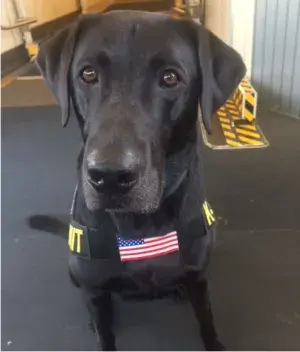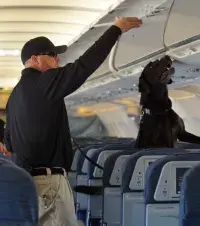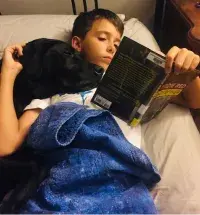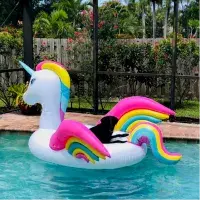
One of America’s furry heroes has passed away.
Qqualls, who died from suspected cancer-related complications on July 27 at the age of 13, served TSA for more than 8 1/2 years and came from a very rare family lineage.
The black Labrador retriever was named in honor of fallen Marine Lance Cpl. Louis W. Qualls, who was killed during the Iraq War in November 2004. Qqualls was bred through TSA’s former puppy program at Lackland Air Force Base in San Antonio. His litter was the first third-generation bomb dog litter. Qqualls’ bloodlines included a rich background of TSA canines and Australian airport police bomb dogs. His grandmother was bred from Australian Customs dogs, his parents were TSA canines, and all nine puppies in his litter served in TSA and other agencies across our nation.
Wyatt Rhoden was proud to call Qqualls his partner, friend and family member. Rhoden and Qqualls joined forces at TSA in January 2011, and right away in basic canine training, Rhoden knew Qqualls was special.
“Qqualls and I graduated at the top of the class and were awarded the ‘Top Dog’ in canine school,” Rhoden recalled. “Qqualls was all about work at the airport. He had a high drive to hunt, and we engaged in a fun game of tug-of-war when he found what he was looking for.”
Rhoden, like Lance Cpl. Qualls, is an Iraq War veteran and was proud to carry the Qualls name through his canine partner.
“I felt a great duty and honor to work with canine Qqualls knowing his namesake continued a legacy of one of our country’s great military members who gave the ultimate sacrifice to protect our freedoms,” Rhoden said. “I felt even more connected to Lance Cpl. Qualls’ story, because I was in theatre at the same time as Qualls in 2004 during Operation Iraqi Freedom.”
Days on the job for Rhoden and canine Qqualls consisted of security patrols, passenger screening, training and many rounds of tug-of-war, Qqualls’ favorite game. They teamed up on several key missions over the course of their career together. They were deployed to Fort Lauderdale-Hollywood International Airport (FLL) to help with security sweeps and passenger screening after a mass shooting at FLL took five lives in January 2017. Rhoden and Qqualls provided specialized screening for Wounded Warriors and Boston Marathon bombing victims at a para alpine skiing event in Vail, Colorado. They also supported Honor Flights for World War II veterans and TSA teams in Atlanta and Chicago during the peak summer travel season.
What made Qqualls so special?
“He was strikingly handsome, loving and loyal to his family, but all business with strangers,” Rhoden replied. “After a busy day at work sniffing passengers, if a neighbor or friend came over to the house, he would meet them at the door for a security check. He would give them a good sniff, and before they could reach down and pet him, he would turn and walk away to curl back up with a family member.”
Qqualls enjoyed his downtime with the family and loved playing hard.
“When he got home from work, he loved to cuddle for evening TV shows with my wife and story time with my children,” said Rhoden. “In retirement, Qqualls enjoyed going on walks, eating ice cream, but most of all swimming in the pool … even when he wasn’t supposed to. He enjoyed sniffing packages delivered to our front door and chewing on his Kong (dog toy).”
Qqualls was forced to retire in October 2019 due to a serious hip condition. However, he regained full mobility after having hip replacement surgery, which the government paid for due to his service to our country.
The TSA puppy breeding program ended in 2013, but Scott Thomas, the program’s former director, has fond memories of Qqualls, his rare pedigree and the program.
“Qqualls had littermates spread from Honolulu to Miami,” Thomas said. “Seven dogs in his litter were accepted into TSA training, one was selected as a TSA breeder and one brother served the Texas Highway Patrol. Two of the litter were so outstanding they were accepted into TSA canine training before reaching 12 months of age. His parents and grandparents were bred and selected within the TSA breeding program. Qqualls was a fine example of how selective breeding helped protect our nation.”
Now a canine supervisor at Southwest Florida International Airport, Rhoden no longer has that day-to-day on-the-job interaction with a canine partner, and he admits he misses it.
“For nearly 12 years in TSA, I worked a dog daily,” said Rhoden. “I miss the feel of a leash in my hand and the connection with my canine partner. There is nothing else like the feeling of teamwork that you have with a canine when you search for explosives.”
And now, he misses the feel of the leash at home with his good buddy Qqualls but will carry the great memories of their 11 years together.
By Don Wagner, TSA Strategic Communications & Public Affairs



